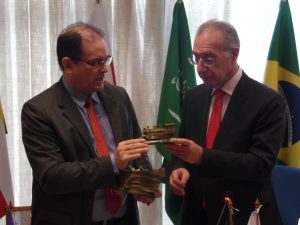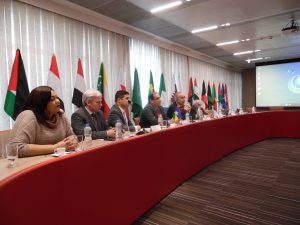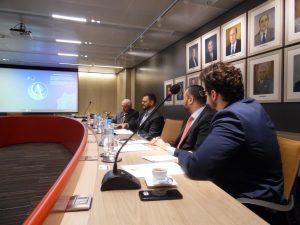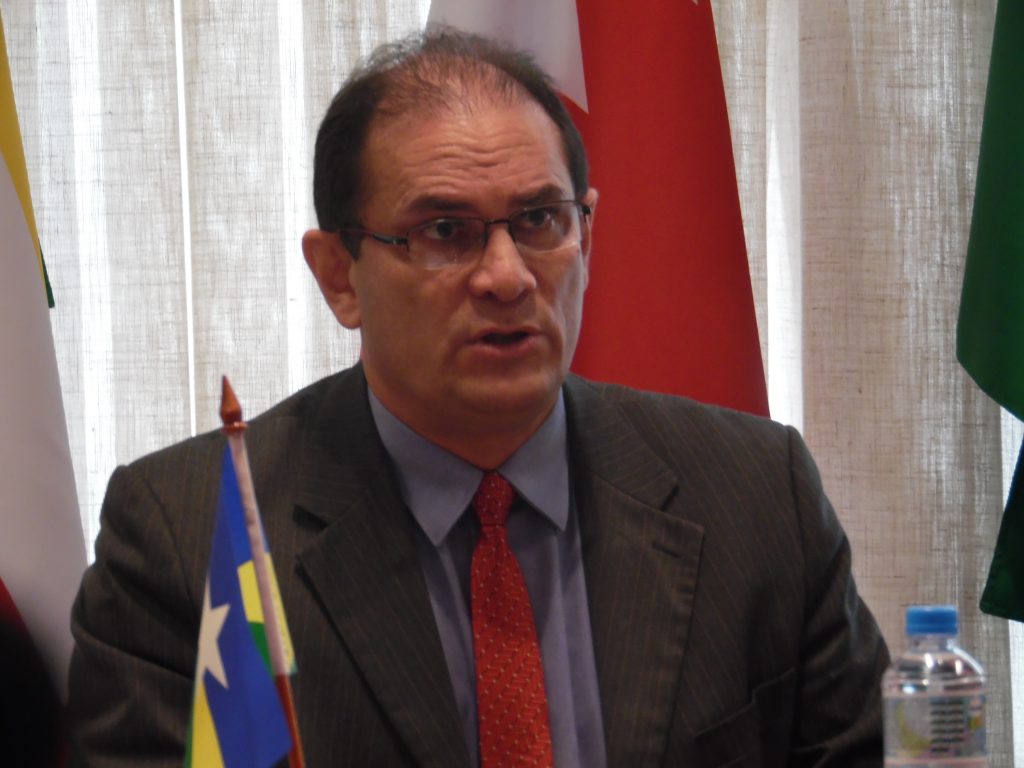São Paulo – Brazil’s Rondônia state can supply beef, fish, coffee and other goods to Arab countries. It is also expanding its agricultural areas by recovering degraded land and this will require fertilizers, which the Arab countries are manufacturers of. These were some of the opportunities for the state to build ties with the Arab world that were discussed by Rondônia governor Daniel Pereira (pictured above) and Arab Brazilian Chamber of Commerce president Rubens Hannun in a meeting this Wednesday (13).
Pereira was welcomed alongside his delegation at the Chamber’s offices in São Paulo. He told ANBA about fields that could be explored in relations with Arab countries. The visit was prompted by facts that drew the governor’s attention to that region, including an event held with embassies’ staffs in Brasília to promote Rondônia around the world, during which contact was made with diplomats from Oman; and the fact that export-oriented meat packers and fish companies have settled in Rondônia and are looking to sell to Arab countries.

Pereira said Rondônia has the sixth biggest livestock herd in Brazil and is the leading producer of native fish (from the Amazon) in captivity. The state comprises part of the Amazon rainforest. “Those business opportunities have brought us here,” he said of the visit to the Chamber. Tambaqui is one of the main native Amazon fish species. “The whole world is at least aware of the name tambaqui, and once one has sampled its flavor, they can never go back. It’s a really flavorful fish,” he said.
Rondônia’s fish output increased tenfold over the last eight years and can potentially increase by ten times again. According to the governor, however, the state requires investment in industrial processing. “Production has grown in an amazing way,” he says. In this sense, one action already underway is the building of a fish processing plant led by businessman Casemiro Tércio Carvalho, of Garín Investimentos. Last April, Carvalho joined the Annual Investment Meeting (AIM), a conference on foreign direct investment in Dubai, the United Arab Emirates.
The governor said the state is available to manufacture goods to meet demand from Arab nations. He explains that Rondônia’s miscegenation – the state is home to people from Rio Grande do Sul, Santa Catarina, Paraná, São Paulo, Minas Gerais, from the Northeast states and Espírito Santo – means its productive sector is adaptable. “If there’s a given product that suits the tastes and consumption habits of Arabs, we can quickly start manufacturing it.”

Rondônia is active in agriculture, boasts 14 million head of cattle and is the leading milk producing state in North Brazil. It is also adapting its coffee farming to local weather conditions, and this is leading to high quality and yields. “We have been joining contests and events, and our coffee has been winning them,” says the governor.
Daniel Pereira also envisions a possibility for Arabs to supply fertilizers to Rondônia and Bolívia, which its opening up a new agricultural frontier spanning some 4.5 million hectares in the Beni area, which shares borders with Rondônia. “What does Rondônia have to do with that? They will ship out their production through Rondônia, so this is an opportunity for the Bolivians to bring their crops to the seaport and then carry fertilizers on their way back. This would also help with the costs,” the governor suggests.
Rondônia is also increasing farming in existing agricultural areas which are degraded but can be recovered. The Amazon rainforest covers 62% of the state and the plan is to keep it that way. “Our biggest mission is to prevent deforestation of new areas. We are raising awareness, speaking with the producers, telling them that progress isn’t about increasing planted area, it’s about how you explore what you have,” says Pereira.
Environmental awareness is also part of the schools’ curricula, according to the governor. When it comes to livestock, Rondônia is transitioning from free-range to semi-confined cattle farming, according to Pereira.

After the meeting at the Arab Chamber, the governor is planning actions to build ties with Arab countries. He even invited the Chamber to join the Porto Agro expo from August 29 to September 1 in Rondônia’s state capital Porto Velho. Daniel Pereira also plans to hold a meeting in Brasília with embassies of Arab countries.
At the meeting, Hannun told the governor that Arab countries are predisposed to investing in food production and related fields, like infrastructure and logistics, out of necessity. He said there are sectors of Rondônia’s economy which are appealing to Arab investors, but noted that it takes continuity and trust-building in order for relations to evolve.
Besides Daniel Pereira, also visiting the Arab Chamber were the Rondônia State Development superintendent Basilio Leandro de Oliveira, Military undersecretary Philippe Rodrigues Menezes, the managing director of the Rondônia chapter of the Brazilian Micro and Small Business Support Service (Sebrae), Valdemar Camata Júnior, and other advisers.
Arab Chamber delegates attending the meeting besides Hannun included director William Atui, CEO Michel Alaby, Special Projects adviser Tamer Mansour and commercial adviser João Bianchini. Executive Casemiro Tércio Carvalho was also in attendance. Hannun and Pereira exchanged presents.
Translated by Gabriel Pomerancblum




